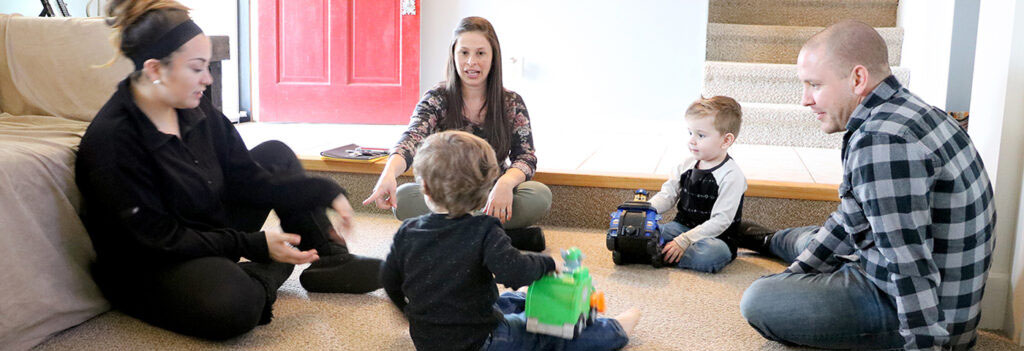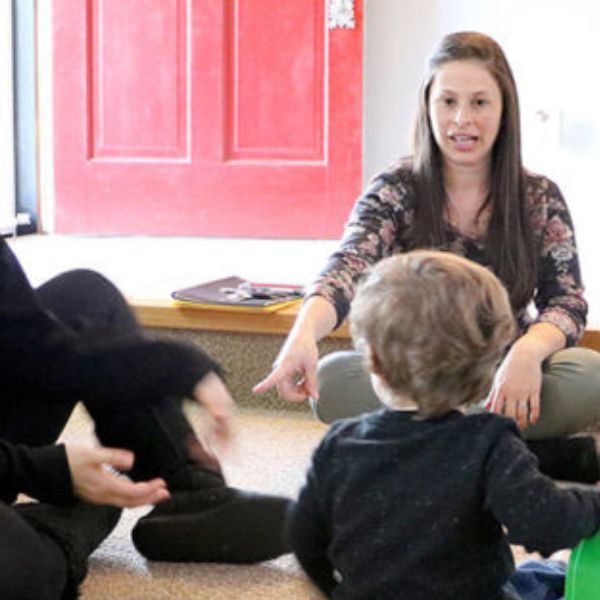Menu


This early intervention is provided in the home or in other community settings and is based on collaborative consultation with “caregivers,” including families, child care providers, and others that spend significant time with children.
Siskin Children’s Institute works with TEIS to provide home visiting services to approximately 400 families in the Southeast TEIS District counties of Bledsoe, Bradley, Grundy, Hamilton, Marion, Meigs, McMinn, Polk, Rhea and Sequatchie.
Our goal is to support the entire family, not only the child with special needs. Therefore, program goals include supporting and strengthening the family’s quality of life, increasing caregivers’ sense of competence, and improving family satisfaction with daily routines. Ultimately, improvements in these areas should lead to the child’s growth in three areas: engagement, independence, and social relationships.
Early Intervention coaches from our Home and Community-based Early Intervention team visit the family, not just the child, to build the family’s ability to have the most impact on the child’s learning and development. Because the process is a collaborative consultation with all involved, families help set the agenda for the visit. Below is a list of supports provided by our in-home therapy team.
Home visitors are positive, responsive, oriented to the whole family (not just the target child), friendly, and sensitive.
All referrals to the Siskin home visiting therapy services come from the Southeast Tennessee Early Intervention System District Office. If you think a child can benefit from early intervention, you should contact the TEIS district office and they will determine whether the child is eligible for services.
If a child is eligible, TEIS will work with the family to create Individualized Family Service Plan (IFSP). An IFSP provides the framework for early intervention, including home and community visits. The plan typically includes strengths, needs, outcomes/goals and services to be provided. If TEIS includes home visiting services by Siskin Children’s Institute in the IFSP, the TEIS district office will contact the program coordinator at the Institute, who will assign a developmental therapist to the family.
The frequency and intensity of home visiting services is decided at IFSP meetings with the TEIS service coordinator. Often, this means weekly home visits, and it also may include meetings with parents, other child care providers, and service coordinators.
For more information regarding the referral process please contact the following:
Southeast Tennessee TEIS
1501 Riverside Drive, Suite 230
Chattanooga, TN 37406
423.624.6344
An online referral to TEIS can be made here.
Siskin Children’s Institute uses the Family Guided Routines Based Intervention (FGRBI) model. Learn more about FGRBI here.
Our model strongly supports caregiver-delivered interventions versus strictly professional-delivered interventions. In the professional-delivered approach, children receive one or two hours of service a week from the professional, and that’s where the intervention ends. The caregiver-delivered approach is based on the fact that very young children do not learn in lessons or sessions. Instead, they learn throughout every day. Therefore, if professionals teach parents or caregivers how to work with their child, the child can receive significant daily intervention throughout the day.
Although the family’s home is a common location for visits, meetings can take place at child care centers, with therapists, and other community locations. Early interventionists want to work with all adults who care for the child with developmental delays. This includes parents, child care staff, therapists, and others care givers.
There is no curriculum beyond the Individualized Family Support Plan (IFSP) and the child’s routines. Home visitors use their knowledge of (a) child development, (b) behavioral principles and (c) incidental teaching to make specific suggestions to families. Intervention, which is what the family does with the child (i.e., parenting!), happens throughout daily life at home and in the community. Intervention also occurs with other caregivers at locations such as child care centers, therapy visits, and so on.
Home visits usually occur weekly. When families have 6 to 12 outcomes/goals, weekly support often is warranted. The frequency and intensity of services is decided at IFSP meetings with the TEIS service coordinator.
This project is funded under a Grant Contract with the State of Tennessee.